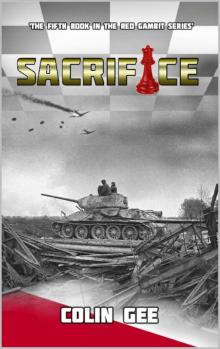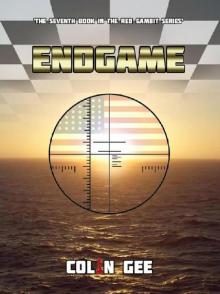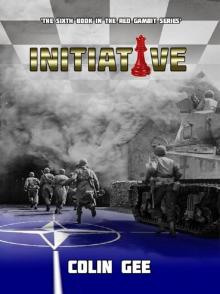Initiative (The Red Gambit Series Book 6) Read online
Initiative
WRITTEN BY COLIN GEE
The Sixth book in the ‘Red Gambit’ series.
25th April 1946 to 19th August 1946.
All rights reserved. No part of this publication may be reproduced, stored in a retrieval system, or transmitted, in any form or by any means, electronic, mechanical, photocopying, recording, or otherwise, without the prior permission of the publisher and copyright holder. The author has asserted the moral right to be identified as the author of this work.
ISBN-10: 1517169259
ISBN-13: 978-1517169251
Copyright © 2015 - Colin Gee
If I might take the opportunity to explain copyright in the simplest terms. It means that those of you who decide to violate my rights by posting this and others of my books on websites that permit downloading of copyrighted materials, are not only breaking the law, but also depriving me of money.
You may not see that as an issue, but I spend a lot of my limited funds to travel and research, just to make sure I get things as right as I can.
I ask you sincerely, please do not break the copyright, and permit me to profit properly from the labours I have undertaken.
Thank you.
Series Dedication
The Red Gambit series of books is dedicated to my grandfather, the boss-fellah, Jack ‘Chalky’ White, Chief Petty Officer [Engine Room] RN, my de facto father until his untimely death from cancer in 1983, and a man who, along with many millions of others, participated in the epic of history that we know as World War Two.
Their efforts and sacrifices made it possible for us to read of it, in freedom, today.
Thank you, for everything.
Overview by author Colin Gee
If you have already read the first five books in this series, then what follows will serve as a small reminder of what went before.
If this is your first toe dipped in the waters of ‘Red Gambit’, then I can only advise you to read the previous books when you can.
In the interim, this is mainly for you.
After the end of the German War, the leaders of the Soviet Union found sufficient cause to distrust their former Allies, to the point of launching an assault on Western Europe. Those causes and the decision-making behind the full scale attack lie within ‘Opening Moves’, as do the battles of the first week, commencing on 6th August 1945.
After that initial week, the Soviets continued to grind away at the Western Allies, trading lives and materiel for ground, whilst reducing the combat efficiency of Allied units from the Baltic to the Alps.
In ‘Breakthrough’, the Red Army inflicts defeat after defeat upon their enemy, but at growing cost to themselves.
The attrition is awful.
Matters come to a head in ‘Stalemate’ as circumstances force Marshall Zhukov to focus attacks on specific zones. The resulting battles bring death and horror on an unprecedented scale, neither Army coming away unscathed or unscarred.
In the Pacific, the Soviet Union has courted the Empire of Japan, and has provided unusual support in its struggle against the Chinese. That support has faded and, despite small scale Soviet intervention, the writing is on the wall.
‘Impasse’ brought a swing, perhaps imperceptible at first, with the initiative lost by the Red Army, but difficult to pick up for the Allies.
The Red Air Force is almost spent, and Allied air power starts to make its superiority felt across the spectrum of operations.
The war takes on a bestial nature, as both sides visit excesses on each other.
Allied planning deals a deadly blow to the Soviet Baltic forces, in the air, on the sea, and on the ground. However, their own ground assaults are met with stiff resistance, and peter out as General Winter spreads his frosty fingers across the continent, bringing with him the coldest weather in living memory.
‘Sacrifice’ sees the Allied nations embark on their recovery, assaults pushing back the weakening red Army, for whom supply has become the pivotal issue.
Its soldiers are undernourished, its tanks lack enough fuel, and its guns are often without shells.
Soviet air power is a matter of memory, and the Allies have mastery of the skies.
In the five previous books, the reader has journeyed from June 1945, all the way to April 1946. The combat and intrigue has focussed in Europe, but men have also died in the Pacific, over and under the cold waters of the Atlantic, and on the shores of small islands in Greenland.
Battles have occurred from the Baltic to the Adriatic, some large, some small, some insignificant, and some of huge import.
In Initiative, the fighting develops again, and the book deals with that, as well as the other matters of war, that will take the reader from the Kalahari Desert to an airfield on Tinian, from China to the Black Sea coast, and from a Swedish castle to a hotel in Bretton Woods, New Hampshire.
As I did the research for this alternate history series, I often wondered why it was that we, west and east, did not come to blows once more.
We must all give thanks it did not all go badly wrong in that hot summer of 1945, and that the events described in the Red Gambit series did not come to pass.
My profound thanks to all those who have contributed in whatever way to this project, as every little piece of help brought me closer to my goal.
[For additional information, progress reports, orders of battle, discussion, freebies, and interaction with the author please find time to visit and register at one of the following-
www.redgambitseries.com, www.redgambitseries.co.uk, www.redgambitseries.eu,
Also, feel free to join Facebook Group ‘Red Gambit’.]
Thank you.
I have received a great deal of assistance in researching, translating, advice, and support during the years that this project has so far run.
In no particular order, I would like to record my thanks to all of the following for their contributions. Gary Wild, Jan Wild, Jason Litchfield, Peter Kellie, Jim Crail, Craig Dressman, Mario Wildenauer, Loren Weaver, Pat Walsh, Keith Lange, Philippe Vanhauwermeiren, Elena Schuster, Stilla Fendt, Luitpold Krieger, Mark Lambert, Simon Haines, Carl Jones, Greg Winton, Greg Percival, Robert Prideaux, Tyler Weaver, Giselle Janiszewski, James Hanebury, Renata Loveridge, Jeffrey Durnford, Brian Proctor, Steve Bailey, Paul Dryden, Steve Riordan, Bruce Towers, Gary Banner, Victoria Coling, Alexandra Coling, Heather Coling, Isabel Pierce Ward, Hany Hamouda, Ahmed Al-Obeidi, Sharon Shmueli, and finally BW-UK Gaming Clan.
It is with sadness that I must record the passing of Luitpold Krieger, who succumbed to cancer after a hard fight.
One name is missing on the request of the party involved, who perversely has given me more help and guidance in this project than most, but whose desire to remain in the background on all things means I have to observe his wish not to name him.
None the less, to you, my oldest friend, thank you.
Wikipedia is a wonderful thing and I have used it as my first port of call for much of the research for the series. Use it and support it.
My thanks to the US Army Center of Military History and Franklin D Roosevelt Presidential Library websites for providing the out of copyright images.
All map work is original, save for the Château outline, which derives from a public domain handout.
Particular thanks go to Steen Ammentorp, who is responsible for the wonderful www.generals.dk site, which is a superb place to visit in search of details on generals of all nations. The site has proven invaluable in compiling many of the biographies dealing with the senior officers found in these books.
If I have missed anyone or any agency I apologise and promise to rectify the omission at the earliest o
pportunity.
At one stage in the writing of ‘Initiative’, I found myself at a real crunch point, where I wondered about one part of my overall story, and fortunately had the sense to put it to a group of American members of the Facebook group. I am extremely grateful that I did so, as it was quickly established that a crucial piece of my ‘US’ story simply wouldn’t stand up to close examination by an American audience.
I am very indebted to the following members of the Facebook group for coming to my aid.
Thanks go to Giselle Janezewski, James Hanebury, Gary Banner, Keith Lange, Bruce Towers, Jim Crail, and Robert Clarke.
Author’s note.
The correlation between the Allied and Soviet forces is difficult to assess for a number of reasons.
Neither side could claim that their units were all at full strength, and information on the relevant strengths over the period this book is set in is limited as far as the Allies are concerned and relatively non-existent for the Soviet forces.
I have had to use some licence regarding force strengths and I hope that the critics will not be too harsh with me if I get things wrong in that regard. A Soviet Rifle Division could vary in strength from the size of two thousand men to be as high as nine thousand men, and in some special cases could be even more.
Indeed, the very names used do not help the reader to understand unless they are already knowledgeable.
A prime example is the Corps. For the British and US forces, a Corps was a collection of Divisions and Brigades directly subservient to an Army. A Soviet Corps, such as the 2nd Guards Tank Corps, bore no relation to a unit such as British XXX Corps. The 2nd G.T.C. was a Tank Division by another name and this difference in ‘naming’ continues to the Soviet Army, which was more akin to the Allied Corps.
The Army Group was mirrored by the Soviet Front.
Going down from the Corps, the differences continue, where a Russian rifle division should probably be more looked at as the equivalent of a US Infantry regiment or British Infantry Brigade, although this was not always the case. The decision to leave the correct nomenclature in place was made early on. In that, I felt that those who already possess knowledge would not become disillusioned, and that those who were new to the concept could acquire knowledge that would stand them in good stead when reading factual accounts of WW2.
There are also some difficulties encountered with ranks. Some readers may feel that a certain battle would have been left in the command of a more senior rank, and the reverse case where seniors seem to have few forces under their authority. Casualties will have played their part but, particularly in the Soviet Army, seniority and rank was a complicated affair, sometimes with Colonels in charge of Divisions larger than those commanded by a General. It is easier for me to attach a chart to give the reader a rough guide of how the ranks equate.
Also, please remember, that by now attrition has downsized units in all armies.
Fig # 1 – Table of comparative ranks.
Book Dedication
History is a strange beast.
It contains lessons from which we never seem to truly learn.
And yet, the recorded matters of our past are constantly scrutinised and replayed by academicians and amateurs alike, criticising and second-guessing those who did what they thought was right at the time, and did so without either the benefit and safety of armchair comforts or time to make an extended and reasoned judgement.
World War Two has been replayed in minds since the final shots echoed into history and, in some cases, whilst the firing was still going on.
The armchair warriors and professors often decide that things were not done right, opportunities were missed, or that moral lines were overstepped.
On that last point, I almost always find myself in total disagreement with those who would seek to undermine and criticise those who undertook the missions and tasks that fall under scrutiny post-era.
RAF’s Bomber Command was vilified for many years, a stance first adopted by Churchill, who offered up an opinion about the attack on Dresden that was interpreted as critical, and as distancing himself from the efforts made in the bombing offensive.
We British, as a nation, should be disgusted that we only chose to honour their efforts recently, when most of the survivors had passed away.
The truth is quite simple.
We were at war, total war, and the bombing of civilians and towns was undertaken by all sides.
Not an excuse but an undeniable fact.
History simply teaches that the RAF, USAAF, and Allied units were far better at it than our then enemy, and had far better equipment with which to wage total war.
The dropping of the bombs on Hiroshima and Nagasaki has been criticised from the moment they were detonated.
Even now, the arguments continue to evolve, and criticism is laid at the door of the pilots and men who flew the Silverbirds, and those who commanded them to do the deeds over Japan.
Regardless of how you see the Lancaster over Dresden or the B-29 over Nagasaki, the boys inside were doing a job for their country, under orders, and doing it to the best of their ability, and far too often, at the cost of their lives.
No matter what the arguments, we cannot disparage those who fought for us and carried the battle to the enemy and who did their duty, and what they thought was right, and certainly not because they were more proficient or had technology in excess of the enemy.
They honoured us with their efforts, so how can we dishonour them with criticism of their motivation and their morality?
So, to all those who did their duty and were pilloried by act or omission, I dedicate ‘Initiative’ to you.
May I remind the reader that his book is written primarily in English, not American English. Therefore, please expect the unashamed use of ‘U’, such as in honour and armoured, unless I am using the American version to remain true to a character or situation.
By example, I will write the 11th Armoured Division and the 11th US Armored Division, as each is correct in national context.
Where using dialogue, the character uses the correct rank, such as Mayor, instead of Major for the Soviet dialogue, or Maior for the German dialogue.
Otherwise, in non-dialogue circumstances, all ranks and units will be in English.
Although I never served in the Armed forces, I wore a uniform with pride, and carry my own long-term injuries from my service. My admiration for our young service men and women serving in all our names in dangerous areas throughout the world is limitless. As a result, ‘the Star and Garter Homes’ is a charity that is extremely close to my heart. My fictitious characters carry no real-life heartache with them, whereas every news bulletin from the military stations abroad brings a terrible reality with its own impact, angst, and personal challenges for those left behind when one of our military pays the ultimate price. Therefore, I make donations to ‘the Star and Garter Homes’, and would encourage you to do so too.
Book #1 - Opening Moves [Chapters 1-54]
Book #2 - Breakthrough [Chapters 55-77]
Book #3 - Stalemate [Chapters 78-102]
Book #4 – Impasse [Chapters 103 – 125]
Book #5 - Sacrifice [Chapters 126 - 148]
Book #6 – Initiative [Chapters 149 - 171]
Book #7 - Endgame [Chapters 172 - ?]
List of chapters and sections.
Series Dedication
Overview by author Colin Gee
Author’s note.
Book Dedication
List of chapters and sections.
Chapter 149 - THE POWER
1000 hrs, Tuesday 30th April, Frankenberg an der Eder, Germany.
1100 hrs, Wednesday, 1st May, 1946, Red Square, Moscow, USSR, and the Oval Office, Washington DC, USA.
Chapter 150 – THE DISBELIEF
1007hrs, Thursday, 2nd May 1946, the Kremlin, Moscow, USSR.
1106 hrs, Friday 10th May 1946, one kilometre south of Gedser, Denmark.
1956 hrs, Monday 13th May 194
6, Mount Washington Hotel, Bretton Woods, New Hampshire, USA.
Chapter 151 – THE HORROR
0601 hrs, Monday, 27th May 1946, Briefing room, North Field, Tinian, Mariana Island Group.
0301 hrs, Wednesday, 29th May 1946, North Field, Tinian, Marianas Island Group.
0708 hrs, Wednesday, 29th May 1946, airborne, one hour from Alternate 2, Kyūshū Island, Japan.
0709 hrs, Wednesday, 29th May 1946, airborne, just over an hour from Alternate 2, Kyūshū Island, Japan.
0755 hrs, Wednesday, 29th May 1946, Point Alpha, over Kyūshū Island, Japan.
0827 hrs, Wednesday, 29th May 1946, Kanoya Airfield, Kyūshū, Japan.
0902 hrs, Wednesday, 28th May 1946, above the Hayatonoseto Strait, Uji Island Group, Japan.
1113 hrs, Wednesday, 29th May, 1946, on approach to Futenma Airfield, Okinawa.
1444 hrs, Wednesday, 29th May 1946, Office of the General Secretary, the Kremlin, Moscow, USSR.
Chapter 152 – THE MIKADO
0958 hrs, Monday, 10th June 1946, the Oval Office, Washington DC, USA.
Chapter 153 – THE RONIN
1127 hrs, Monday 10th June 1946, Height 404, Baisha River, Zhujiawan, China.
1141 hrs, Monday 10th June 1946, Height 404, Baisha River, Zhujiawan, China.
1157 hrs, Monday 10th June 1946, airborne over Baisha River valley, Zhujiawan, China.
1224 hrs, Monday 10th June 1946, Height 404, Zhujiawan, China.
Earlier that day… 0455 hrs, Monday, 10th June 1946, Secret dock, Submarine Division One, Kannonzaki, Kure, Japan.
Chapter 155 – DER WERWÖLFE
1200 hrs, Wednesday, 12th June 1946, Amstetten, Germany.
1200 hrs, Wednesday, 12th June 1946, near Route 7312, one kilometre east of Bräunisheim, Germany.

 Sacrifice (The Red Gambit Series. Book 5)
Sacrifice (The Red Gambit Series. Book 5) Endgame (The Red Gambit Series Book 7)
Endgame (The Red Gambit Series Book 7) Initiative (The Red Gambit Series Book 6)
Initiative (The Red Gambit Series Book 6)